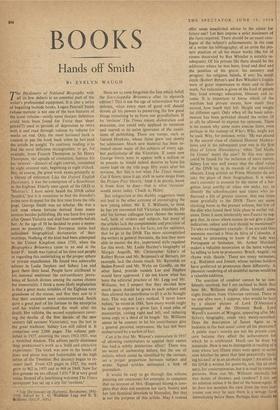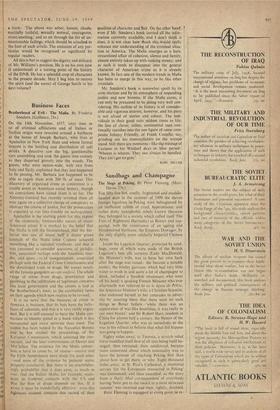BOOKS
Hands off Smith
By EVELYN WAUGH
7-The Dictionary of National Biography with / all its few defects is an essential part of the writer's professional equipment. It is also a series of beguiling bedside books. Logan Pearsall Smith (whose 'memoir is not one of the best features of the latest volume—surely some sharper definition could have been found for Trivia than 'short pieces'?) used in 'periods of depression to retire with it and read through volume by volume for weeks on end. Only the most harassed hack is content to put the book back when he has read the article he sought. To continue reading is to find the most delicious incongruities; to go, for example, from Francis Thompson to Sir Henry Thompson, the apostle of cremation, famous for his 'octaves'—dinners of eight courses,, consumed by eight eminent men, beginning at eight o'clock. Rut, of course, the great work exists primarily as a library of reference: Like the Oxford English Dictionary, it was the conception of a Scotchman in the Eighties. Elderly men speak of the OED as 'Murray's.' t have never heard the DNB called 'Smith's,' but it is vexatious to find the founder's name now dropped for the first time from the title page. George Smith was no scholar. He was a rich man whose fortune derived from many sources besides publishing. He was born five years after Queen Victoria and died four months before her. At the age of 58 he decided to erect a monu- ment to posterity. Other European states had subsidised biographical dictionaries of their worthies. Nothing of the kind had been attempted in the United Kingdom since 1793, when the Biographica Britannica came to an end at the letter F. Smith was typical of his time and people in regarding this undertaking as the proper sphere of private munificence. He found two admirable editors in Leslie Stephen and Sidney Lee and gave them their head. People have attributed to his national sentiment the extraordinary preva- lence of Scotch divines among the names chosen for immortality. I think a more likely explanation is that a great many notables of the Eighties were grandsons of the manse, and, that they saw to it that their ancestors were commemorated. Smith gave a great part of his fortune to the enterprise and his widow continued the work after his death. Her volume, the second supplement cover= ing the deaths of the first decade of the new century (all eminent Victorians), was the last in the great tradition. Sidney Lee still edited it. It comprises over 2,000 pages. The volume pub- lished in 1927, covering the years 1912-1921, was a wretched shadow. The editors pertly dismissed their predecessor's work as a 'bold and attractive experiment.' The work was now in the hands of dons and pietas, was not fashionable at the high
tables of the Twenties. But decency began to re- assert itself. From 623 pages in 1927, the work grew to 962 in 1937 and to 968 in 1949. Now for five guineas we are offered 1,031.* It is very good value. Instead of 'a heartening welcome The Times newspaper has set up a cry for 'revision.'
* THE DICTIONARY OF NATIONAL BIOGRAPHY, 1941- 1950. Edited by L. G. Wickham Legg and E. T. Williams, (0.U.P., 1058.)
Have we so soon forgotten the fate which befell the Encyclopedia Britannica after its eleventh edition? This is not the age of reformation but of defence, when every man of good will should devote all his powers to preserving the few good things remaining to us from our grandfathers. If by 'revision' The Times meant elaboration and extension, one could only applaud its intention and marvel at its naive ignorance of the condi- tions of publishing. There are names, such as Gerard Hopkins, whose fame grew too slowly for admission. Much new material has been re- vealed about many of the subjects of every age, but particularly of the Victorian. If some new George Smith were to appear with a million or so pounds he would indeed deserve to have his name kept on the title page fifty years after his revision. But this is not what The Times meant. Cut i1 down, spice it up; stick in some snaps from the Picture Post 'library,' bind it in plastic, hawk it from door to door—that is what 'revision' would mean today. Chuck it, Haley.
But indignation at this shabby suggestion must not lead to the other extreme of encouraging the new young editor, Mr. E. T. Williams, to think he has yet recovered full Victorian standards. He and his former colleague have chosen the names well, both of writers and subjects, but many of the articles lack the completeness and precision of their predecessors. It is for facts, not for opinions, that we go to the DNB. The more accomplished the writers in general literature, the less they seem able to master the dry, impersonal style required for this work. Mr. Leslie Hartley's biography of Margot Asquith, Mr. Christopher Sykes's of Robert Byron and Mr. Betjeman's of Berners, for example, lack the classic touch. Mr. Reynolds on Baden-Powell and Mr. Wylie on Gandhi, on the other hand, provide models Lee and Stephen would have approved. I do not know what has been the editorial practice of Mr. Legg and Mr. Williams, but I suspect that they decided how much space should be given to each subject and then allowed the contributor to fill it as he thought best. This was not Lee's method. 'I never knew before,' he wrote in 1884, 'how many words might be used to express a given fact. I read piles of manuscript, cutting right and left, and reducing some copy to a third of its length.' Mr. Williams seems to be content to let his contributors give a general personal impression. He has not been embarrassed by a surfeit of fact.
Can it be that Mr. Weaver's innovation in 1937 of allowing contributors to append their names has had a subtly deleterious effect? There was no secret of authorship before, but the use of initials, which could be identified. by the curious, set a proper proportion between subject and writer. Signed articles insinuated a hint of journalism.
It would be easy to go through this volume pointing out omissions; for example, to complain that no account of Mrs. (Eugenie) Strong is com- plete that does not mention her early beauty and her late fanatical devotion to Mussolini. But that is not the purpose of this article. May I instead
offer some unsolicited advice to the editor for future use? Let him impose a strict minimum of the facts required. There should be an exact cata- logue of the subject's achievements; in the case of a writer his bibliography; of an artist the pre- sent position of all his major works (the list of rooms decorated by Rex Whistler is notably in- adequate). Of his private life there should be the addresses where he was born, lived and died and the position of his grave; his ancestry and progeny; his religious beliefs, if any; his social circle (Robert Byron's and Rex Whistler's friends were of great importance to them and to their work. No indication is given of the kind of people they lived among); education, illnesses and in- come. It is important to know which of the worthies had private means, how much they earned, how -much they left. Height and weight (at different ages). Only when all the basic infor- mation has been provided should the writer (if at all) be allowed to express his opinions. There is no reason why some more ,concise form, even perhaps in the manner of ,Who's Who, might not be used. Why, for instance, write : 'He was placed in the second 'class of classical Honour Modera- tions and in the subsequent year was in the first class of Litera, Humattiores,' when '2nd Mods, 1st Greats' meets the case? In this way space could be found for the inclusion of more names. Sidney Lee was well aware that the chief value of the DNB lay in its records of the relatively obscure. Long articles on Prime, Ministers do not take the' place of their biographies. It is when one's curiosity is aroused by the statue of a for- gotten local worthy or when one seeks, say, to identify the schoolmasters and tutors who in- fluenced a life of greater interest, that one turns most gratefully to the DNB. There are some crashing bores in the present volume, but few of the dim who found their little place in earlier vol- umes. Does it seem intolerably neo-Fascist to sug- gest that, in cases where names do not give a clear indication, colour and race should be mentioned? To take an imaginary example: if we are told that someone married a Miss da Silva of Colombo, it would be 'interesting to know if the lady was Portuguese or Sinhalese. Mr. Arthur Marshall makes a valuable innovation in the latest volume by telling us how to pronounce 'Brazil, Angela'; to rhyme with 'dazzle.' There are many surnames, e.g., Blakiston and Jowett, whose various holders have preferred to pronounce them differently. A phonetic rendering of all doubtful names would be' a valuable addition.
The question of candour cannot be so con- fidently resolved, but I am inclined to think that here Mr. Williams might allow himself some slight freedom from Victorian restraint. There is no one alive now, I suppose, who would be hurt by a clearer picture of Lord D'Abernon's management of the Ottoman Bank. Lord Wavell's account of Wingate, appearing after Mr. Sykes's biography, reads very mealy-mouthed. Does the description of James Agate as 'a hedonist in the best sense' cover all his pleasures? A public man's morals are not his private con- cern because they affect the achievement fo which he is celebrated. Much can be done b innuendo. How is one to distinguish in reading of man whose last fifteen years were spent in seclu sion whether he spent that time prayerfully 'mak ing his soul' or in an alcoholic stupor? An article i the DNB is written for posterity, not, like an obit uary, for contemporaries, but it is read by contem- poraries. How can Mr. Williams reconcile his two duties of decency and candour? I can see. no solution unless it be that of the house-agent. 1 he does not mention the view from the west becV, rooms you may be sure there is a sewage farm!, immediately below them. Perhaps there should be a form : 'The above was sober, honest, chaste, maritally faithful, sexually normal, courageous, sweet-smelling,' and so on through the list of un- mentionable failings, which should be attached to the foot of each article. The omission of any par- ticular would be recognised as significant by 'regular readers.
All this is but to suggest the dignity and delicacy of Mr. Williams's position. He is on his own now (1 understand) at a turning point of the history of the DNB. He has a splendid crop of characters in the present decade. May I beg him to restore the spirit (and the name) of George Smith to his next volume?







































 Previous page
Previous page